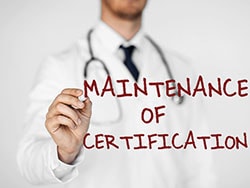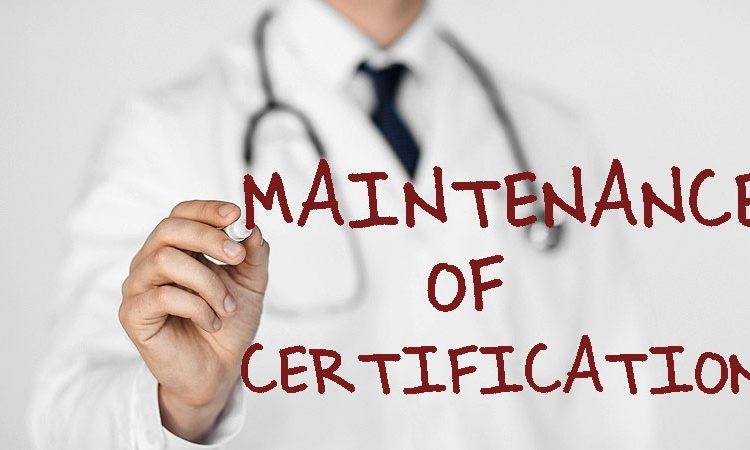Jonathan Weiss, MD, an internist in Middletown, New York, remembers the “nightmare” of having to study for three high-stakes exams in general internal medicine, pulmonary medicine, and critical care medicine required by the American Board of Internal Medicine (ABIM) for recertification.

“I spent months studying for one exam, and then I had to turn around and study for the next one,” he says. “I had to cram a lot of information into my head that was going to leave my head and never reenter it until the next exam.”
In 2006, he switched to an alternative recertification process offered by the National Board of Physicians and Surgeons (NBPAS), which allows him to qualify through continuing medical education (CME) credits. He has no regrets. “I am chief of internal medicine and president of the medical staff at my hospital, and my waiting room is full,” he says.
Facing criticisms by physicians like Weiss, the ABIM and other boards under the aegis of the American Board of Medical Specialties (ABMS) have been making changes in their recertification process, known as Maintenance of Certification (MOC). But will these changes in MOC be enough to woo back critics like Weiss?
Several recent changes have been put into effect; but the jury is out as far as whether they’ll ease physician workload and stress.
1. ABMS Boards Phasing in New Testing Method
In place of the high-stakes exam, which generally is required for each diplomate every 10 years, ABMS boards are introducing longitudinal assessments, which divide the exam format into relatively small groups of questions that can be answered over time. Diplomates take these tests online, use their own reference material, and immediately find out if their answers are correct.
Longitudinal assessments are one of several new ABMS standards announced in October 2021,based on recommendations by its Vision for the Future Commission. In 2020, three quarters of the boards had introduced or were piloting longitudinal assessments.The remainder will be required to introduce them by 2024.
This year, the ABIM is introducing its Longitudinal Knowledge Assessment (LKA), which replaces an earlier version called the Knowledge Check-In, and the American Board of Family Medicine is introducing the Family Medicine Certification Longitudinal Assessment.
Longitudinal assessments have been well received. Ross F. Goldberg, MD, a surgeon in Phoenix, Arizona, and past president of the Arizona Medical Association, took the new biennial longitudinal assessment for the American Board of Surgery in 2021. It was his first recertification test since he was initially certified 10 years before.
“I did it all in one sitting, in one evening. I didn’t intend to, but I just kept on going and completed it,” he says. “I found it to be quite pleasant. There were a couple of things I didn’t know, and I learned from it. In 2023, I’ll do it again.”
The old high-stakes exam could potentially go the way of the dinosaur. “Some boards have simply done away with it,” says Daniel Alyesh, MD, a cardiologist in Littleton, Colorado, who has studied the recertification process. In his view, “The old 10-year exam has not been proven to effectively result in any meaningful knowledge retention.”
2. Alternative Board Is Making Gains
Paul Teirstein, MD, chief of cardiology at the Scripps Clinic in San Diego, founded the NBPAS in 2014 and has watched the alternative board continue to grow, even as the ABMS boards introduced reforms. Almost 10,000 doctors are NBPAS-boarded, and at least 147 hospitals recognize NBPAS for credentialing, according to the NBPAS staff.
In addition, health insurers that require board certification are beginning to recognize NBPAS certification. In December, Geisinger Health Plan began to recognize the NBPAS.
The NBPAS footprint is still tiny compared with the 920,000 physicians certified by ABMS boards and the estimated 3300 hospitals and 1800 health plans that require ABMS board certification, but Teirstein thinks the NBPAS has a bright future because, in his estimation, many doctors will never be satisfied with the ABMS boards.
He urges unhappy physicians to petition to change their hospital’s bylaws to recognize NBPAS certification. To be NBPAS-certified, a doctor needs to have initial certification from an ABMS board, 50 hours of CME in their specialty every 2 years, a valid medical license, and in some cases active hospital privileges in their specialty, Teirstein says.
The Antitrust Division of the US Department of Justice has endorsed alternative boards. In a September 2018 letter, the division encouraged states to recognize “additional, legitimate certifying bodies.”
3. ABMS Promises to Ease Pathway for Multiple-Boarded Doctors
Another new ABMS standard requires boards to make it easier for diplomates with multiple certifications to stay certified, but so far, the boards have said little about how they plan to implement this change. As with all of the new ABMS standards, they have until January 2024 to do this.
How useful the new process will be for multiple-boarded physicians may determine how many of them will continue with ABMS certification.
“I’m grappling with the value of recertifying in internal medicine,” says Alyesh, who is triple-boarded in internal medicine, cardiology, and cardiac electrophysiology. He chafes at the need to be certified in internal medicine, because he is tested on facts outside of his subspecialty that aren’t applicable to his work.
4. Future of Practice Improvement Modules Is Unclear
Many physicians particularly dislike MOC’s practice improvement modules (PIMs), in which they have to collect and analyze practice data, implement improvement strategies, and document improvement. In a 2018 survey of physicians, 75% said PIMs took up too much time, and 32% said they were not relevant to practice.
By 2016, some boards were changing their PIMs. For example, they were adding more qualifying activities, allowing other activities to count as PIMs, and adding self-directed PIMs.
The Continuing Board Certification: Vision for the Future Commission stated that “practice improvement is an important part of continuing certification programs,” but the commission criticized the current programs and noted that diplomates found those programs to be “onerous and artificial.”The new ABMS standards, however, did not specify any changes in PIMs.
5. New ABMS Testing Provides Feedback
“Member Board assessments must provide personalized feedback that enhances learning for diplomates,” the new ABMS standards say.
In testing jargon, this means moving from a summative assessment, where you take a test and simply pass or fail, to a formative assessment, where you are able to learn from an incorrect answer.
Alyesh thinks the ABMS should have gone further and explicitly put education before evaluation. “The ABMS should study whether requiring a specific passing score has any impact on the value of MOC,” he says.
He notes that the radiology and anesthesiology boards do not withhold certification due to low scores on evaluations. The ABIM, on the other hand, requires diplomates who fail the LKA to pass the high-stakes exam instead.
6. Boards May Apply Different Reforms
The new ABMS standards allow each member board some leeway in carrying out its reforms, which concerns leaders of the Pennsylvania Medical Association.
“The variability in flexibility and options across the Boards can still generate feelings of inequity and being overburdened with tasks,” the medical association wrote in an email.
Alyesh also worries about this. In the reforms already implemented, “there has been tremendous variability in how these recommendations have been adopted,” he says, pointing to the boards’ differences on withholding certification due to low scores.
Some boards like the ABIM have resisted reform, says Paul Teirstein. According to Teirstein, “The ABIM was the least eager to carry out the changes recommended by the Vision Commission.” He says the ABIM’s new LKA is far too complex. “It’s a fairly overwhelming task to figure out which of the paths you want to follow,” he adds.
7. Many Physicians Have Already Given Up on MOC
Can the new longitudinal assessments win back physicians who have been frustrated with MOC for nearly a decade? By 2014, many physicians were already speaking out against it.
The ABMS and its member boards have promised reform, but it has been a lengthy process. In 2018, the ABMS appointed its Vision for the Future Commission, which presented a report in February 2019. Based on the commission’s report, the ABMS announced its new standards in October 2021, but member boards do not have to implement these standards until 2024.
Meanwhile, the MOC process has been rejected by many doctors, and many more are skeptical. An online survey conducted for the Vision Commission in 2019 showed that only 12% of physicians found value in MOC, while 41% did not and 46% had “mixed feelings” about it.
Some ABMS boards, such as the American Board of Anesthesiology and the American Board of Surgery, reportedly have the support of many diplomates, but others, like the ABIM, still face heavy criticism, especially among cardiologists like Alyesh. “It’s unfortunate that it took a lot of rancor and disaffection approaching a crisis level just to get to this point,” Alyesh says.
8. No Strong Evidence That MOC Makes for Better Doctors
“When you choose a doctor who is board certified by one of the ABMS member boards, you can be confident he or she is skilled and knowledgeable, an expert in the specialty, and meets a higher standard,” the ABMS says on Certification Matters, its website for the general public.
However, there is no conclusive evidence that MOC makes for better doctors. “There is neither evidence nor general consensus that MOC is a valid method of inspiring or assessing a physician’s competence,” says Teirstein, the San Diego cardiologist.
Teirstein notes that even the Vision for the Future Commission, which basically supports MOC, has cast doubt on MOC’s effectiveness. “There are gaps in research evidence that conclusively demonstrate that diplomate participation in continuing certification leads to better patient outcomes,” the commission stated in its 2019 report.
“There is an emerging body of evidence,” the commission added, that doctors who engage in the recertification process are more likely to stay current, “but this evidence requires further support.”
9. Legal Challenges of MOC Are Failing
In the past decade, opponents of the traditional boards have filed a raft of lawsuits against the ABMS or its member boards, claiming monopolization, corruption, and unjust enrichment.
Many of the lawsuits, however, have been thrown out by the courts, according to an analysis by the Pennsylvania Medical Society, a critic of MOC. In February 2021, for example, a federal appeals court upheld a lower court’s decision against a Pennsylvania lawsuit challenging the ABIM.
10. Most Anti-MOC Laws Allow for Exceptions
Anti-MOC doctors convinced at least 13 states to pass laws restricting use of recertification for licensure and hospital privileges, but these were hollow victories in many states.
According to a 2019 analysis, seven of the new laws apply solely to licensure, but no licensure board required doctors to participate in an MOC program before the passage of anti-MOC laws. Meanwhile, six states (Arkansas, Georgia, Oklahoma, South Carolina, Tennessee, and Texas) prohibit state licensing boards, insurance providers, and hospitals from requiring physicians to maintain a specialty certification through an MOC program. An additional nine states have partial prohibitions.
“What happened was that opponents of these bills said they shouldn’t interfere with a hospital’s own credentialing decisions,” Arizona surgeon Goldberg says. “So Texas leaves it up to each hospital medical staff to decide.”
Conclusion
Recertification is undergoing major changes, but will these modifications be enough to lure back disgruntled doctors who have lost faith in the process and are finding alternatives?
“The changes the ABMS enacted are a great starting point, but there needs to be further continuous improvement,” Alyesh says. He thinks the ABMS boards need to get back to the basics. “Inherently,” he says, “doctors want to find ways to be up to date and to improve, and patients want to receive up-to-date care.”
For more news, follow Medscape on Facebook, Twitter, Instagram, and YouTube.
Source: Read Full Article
